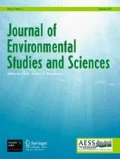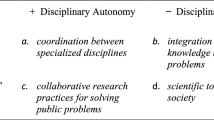Abstract
Understanding and responding to today’s complex environmental problems requires collaboration that bridges disciplinary boundaries. As the barriers to interdisciplinary research are formidable, promoting interdisciplinary environmental research requires understanding what motivates researchers to embark upon such challenging research. This article draws upon research on problem choice and interdisciplinary research practice to investigate motivators and barriers to interdisciplinary climate change (IDCC) research. Results from a survey on the motivations of 526 Ph.D.-holding, early- to mid-career, self-identified IDCC scholars indicate how those scholars make decisions regarding their research choices including the role of intrinsic and extrinsic motivations and the barriers arising from the nature of interdisciplinary research and institutional structures. Climate change was not the main motivation for most respondents to become scholars, yet the majority began to study the issue because they could not ignore the problem. Respondents’ decisions to conduct IDCC research are driven by personal motivations, including personal interest, the importance of IDCC research to society, and enjoyment of interdisciplinary collaborations. Two thirds of respondents reported having encountered challenges in communication across disciplines, longer timelines while conducting interdisciplinary work, and a lack of peer support. Nonetheless, most respondents plan to conduct IDCC research in the future and will choose their next research project based on its societal benefits and the opportunity to work with specific collaborators. We conclude that focused attention to supporting intrinsic motivations, as well as removing institutional barriers, can facilitate future IDCC research.


Similar content being viewed by others
References
Angelstam P, Andersson K, Annerstedt M, Axelsson R, Elbakidze M, Garrido P, Grahn P, Jönsson KI, Pedersen S, Schlyter P (2013) Solving problems in social-ecological systems: definition, practice and barriers of transdisciplinary research. Ambio 42:254–265
Austin AE (2003) Creating a bridge to the future: preparing new faculty to face changing expectations in a shifting context. Rev High Educ 26:119–144
Barry A, Born G, Weszkalnys G (2008) Logics of interdisciplinarity. Econ Soc 37:20–49
Blickenstaff JC (2005) Women and science careers: leaky pipeline or gender filter? Gend Educ 17:369–386
Bridle H, Vrieling A, Cardillo M, Araya Y, Hinojosa L (2013) Preparing for an interdisciplinary future: a perspective from early-career researchers. Futures 53:22–32
Brown VA, Harris JA, Russell JY (eds) (2010) Tackling wicked problems through the transdisciplinary imagination. Earthscan, London
Burkett VR, Suarez AG, Bindi M, Conde C, Mukerji R, Prather MJ, Clair ALS, Yohe GW (2014) Point of departure. In: Field CB et al (eds) Climate change 2014: impacts, adaptation, and vulnerability. Part A: global and sectoral aspects. Contribution of working group II to the fifth assessment report of the Intergovernmental Panel on Climate Change. Cambridge University Press, Cambridge, pp 169–194
Campbell LM (2005) Overcoming obstacles to interdisciplinary research. Conserv Biol 19:574–577
Carayol N, Dalle J-M (2007) Sequential problem choice and the reward system in Open Science. Struct Chang Econ Dyn 18:167–191
Carayol N, Thi TUN (2005) Why do academic scientists engage in interdisciplinary research? Res Eval 14:70–79
Castán Broto V, Gislason M, Ehlers M-H (2009) Practising interdisciplinarity in the interplay between disciplines: experiences of established researchers. Environ Sci Pol 12:922–933
Clark SG, Steen-Adams MM, Pfirman S, Wallace RL (2011) Professional development of interdisciplinary environmental scholars. J Environ Stud Sci 1:99–113
Debackere K, Rappa MA (1994) Institutional variations in problem choice and persistence among scientists in an emerging field. Res Policy 23:425–441
Fischer EV, Mackey KRM, Cusack DF, DeSantis LRG, Hartzell-Nichols L, Lutz JA, Melbourne-Thomas J, Meyer R, Riveros-Iregui DA, Sorte CJB, Taylor JR, White SA (2012) Is pretenure interdisciplinary research a career risk? Eos 93:311–312
Fox HE, Christian C, Nordby JC, Pergams OR, Peterson GD, Pyke CR (2006) Perceived barriers to integrating social science and conservation. Conserv Biol 20:1817–1820
Füssel H-M, Klein RJT (2006) Climate change vulnerability assessments: an evolution of conceptual thinking. Clim Chang 75:301–329
Hackett EJ, Rhoten DR (2009) The Snowbird Charrette: integrative interdisciplinary collaboration in environmental research design. Minerva 47:407–440
Heemskerk M, Wilson K, Pavao-Zuckerman M (2003) Conceptual models as tools for communication across disciplines. Conserv Ecol 7:8
Hollingsworth R, Hollingsworth EJ (2000) Major discoveries and biomedical research organizations: perspectives on interdisciplinarity, nurturing leadership, and integrated structure and cultures. In: Weingart P, Stehr N (eds) Practising interdisciplinarity. University of Toronto Press, Toronto, pp 215–244
Jacobs JA, Frickel S (2009) Interdisciplinarity: a critical assessment. Annu Rev Sociol 35:43–65
Kinzig AP (2001) Bridging disciplinary divides to address environmental and intellectual challenges. Ecosystems 4:709–715
Klein JT (1990) Interdisciplinarity: history, theory, and practice. Wayne State University Press, Detroit
Kuhn TS (1970) The structure of scientific revolutions, 2nd edn. University of Chicago Press, Chicago
Langfeldt L (2006) The policy challenges of peer review: managing bias, conflict of interests and interdisciplinary assessments. Res Eval 15:31–41
Lubchenco J (1998) Entering the century of the environment: a new social contract for science. Science 279:491–497
Lyall C, Fletcher I (2013) Experiments in interdisciplinary capacity-building: the successes and challenges of large-scale interdisciplinary investments. Sci Public Policy 40:1–7
MacMynowski DP (2007) Pausing at the brink of interdisciplinarity: power and knowledge at the meeting of social and biophysical science. Ecol Soc 12:20
Mauser W, Klepper G, Rice M, Schmalzbauer BS, Hackmann H, Leemans R, Moore H (2013) Transdisciplinary global change research: the co-creation of knowledge for sustainability. Curr Opin Environ Sustain 5:420–431
Merton RK (1957) Priorities in scientific discovery: a chapter in the sociology of science. Am Sociol Rev 22:635–659
Miller TR, Baird TD, Littlefield CM, Kofinas G, Chapin FS III, Redman CL (2008) Epistemological pluralism: reorganizing interdisciplinary research. Ecol Soc 13:46
Mitchell RB, Weiler CS (2011) Developing next-generation climate change scholars: the DISCCRS experience. J Environ Stud Sci 1:54–62
Mooney HA, Duraiappah A, Larigauderie A (2013) Evolution of natural and social science interactions in global change research programs. Proc Natl Acad Sci U S A 110:3665–3672
Morse WC, Nielsen-Pincus M, Force JE, Wulfhorst J (2007) Bridges and barriers to developing and conducting interdisciplinary graduate-student team research. Ecol Soc 12:8
Moslemi JM, Capps KA, Johnson MS, Maul J, McIntyre PB, Melvin AM, Vadas TM, Vallano DM, Watkins JM, Weiss M (2009) Training tomorrow's environmental problem solvers: an integrative approach to graduate education. Bioscience 59:514–521
Naiman RJ (1999) A perspective on interdisciplinary science. Ecosystems 2:292–295
National Academy of Sciences (2004) Facilitating interdisciplinary research. The National Academies Press, Washington, DC
Neff MW (2011) What research should be done and why? Four competing visions among ecologists. Front Ecol Environ 9:462–469
Nichols LG (2007) Academic cartography: understanding the directions of modern biological science. Dissertation, University of California, Berkeley
Nissani M (1997) Ten cheers for interdisciplinarity: the case for interdisciplinary knowledge and research. Soc Sci J 34:201–216
Pfirman S, Martin P, Danielson A, Goodman RM, Steen-Adams M, Waggett C, Mutter J, Rikakis T, Fletcher M, Berry L, Hornbach D, Hempel M, Morehouse B, Southard R (2011) Interdisciplinary hiring and career development: guidance for individuals and institutions. National Council for Science and the Environment, Washington, DC
Pfirman S, Martin PJ (2010) Facilitating interdisciplinary scholars. In: Frodeman R, Klein JT, Mitcham C (eds) Oxford handbook on interdisciplinarity. Oxford University Press, Oxford, pp 387–403
Pickett S, Burch WR Jr, Grove JM (1999) Interdisciplinary research: maintaining the constructive impulse in a culture of criticism. Ecosystems 2:302–307
Pohl C (2011) What is progress in transdisciplinary research? Futures 43:618–626
Porter A, Rafols I (2009) Is science becoming more interdisciplinary? Measuring and mapping six research fields over time. Scientometrics 81:719–745
Rafols I, Leydesdorff L, O’Hare A, Nightingale P, Stirling A (2012) How journal rankings can suppress interdisciplinary research: a comparison between innovation studies and business & management. Res Policy 41:1262–1282
Rayner S, Malone EL (eds) (1998) Human choice and climate change: an international assessment. Batellle Press, Washington DC
Redclift M (1998) Dances with wolves? Interdisciplinary research on the global environment. Glob Environ Chang 8:177–182
Reich SM, Reich JA (2006) Cultural competence in interdisciplinary collaborations: a method for respecting diversity in research partnerships. Am J Community Psychol 38:51–62
Reyns NB, Langenheder S, Lennon JT (2007) Specialization versus diversification: a trade-off for young scientists? Eos 88:343–343
Rhoten D (2003) A multi-method analysis of the social and technical conditions for interdisciplinary collaboration. The Hybrid Vigor Institute, San Francisco
Rhoten D (2004) Interdisciplinary research: trend or transition. Items and Issues 5:6–11
Rhoten D, O'Connor E, Hackett EJ (2009) The act of collaborative creation and the art of integrative creativity: originality, disciplinarity and interdisciplinarity. Thesis Eleven 96:83–108
Rhoten D, Parker A (2004) Risks and rewards of an interdisciplinary research path. Science 306:2046
Rhoten D, Pfirman S (2007) Women in interdisciplinary science: exploring preferences and consequences. Res Policy 36:56–75
Rittel HWJ, Webber MM (1973) Dilemmas in a general theory of planning. Policy Sci 4:155–169
Roy ED, Morzillo AT, Seijo F, Reddy SM, Rhemtulla JM, Milder JC, Kuemmerle T, Martin SL (2013) The elusive pursuit of interdisciplinarity at the human-environment interface. Bioscience 63:745–753
Salazar MR, Lant TK, Fiore SM, Salas E (2012) Facilitating innovation in diverse science teams through integrative capacity. Small Group Res 43:527–558
Schmidt G, Moyer E (2008) A new kind of scientist. Nature Rep Clim Chang 2:102–103
Schneider SH (1995) Evolutionary organizational models for interdisciplinary research and teaching of global environmental change. In: Waddington DJ (ed) Global environmental change science: education and training. Springer-Verlag, New York, pp 9–40
Siedlok F, Hibbert P (2014) The organization of interdisciplinary research: modes, drivers and barriers. Int J Manag Rev 16:194–210
Sievanen L, Campbell LM, Leslie HM (2012) Challenges to interdisciplinary research in ecosystem-based management. Conserv Biol 26:315–323
van Rijnsoever FJ, Hessels LK (2011) Factors associated with disciplinary and interdisciplinary research collaboration. Res Policy 40:463–472
Weart S (2013) Rise of interdisciplinary research on climate. Proc Natl Acad Sci U S A 110:3657–3664
Weiler CS (2007) Meeting Ph.D. graduates' needs in a changing global environment. Eos 88:149–151
Winograd M, Hais M (2014) How millennials could upend Wall Street and corporate America. The Brookings Institution, Washington, DC
Woodward K (2005) Encouraging recruitment, promotion and tenure, and awarding merit to interdisciplinary faculty. Interdisciplinary Initiatives Working Group. The Graduate School, The University of Washington, Seattle
Ziman J (1996) Is science losing its objectivity? Nature 382:751–754
Ziman JM (1987) The problem of “problem choice”. Minerva 25:92–106
Zoback ML, Payton A (2007) Crossing boundaries, hitting barriers. Nature 445:22
Zuckerman H (1978) Theory choice and problem choice in science. Sociol Inq 48:65–95
Acknowledgments
We offer thanks to three anonymous reviewers whose considered comments substantially improved this manuscript. This work was supported in part by National Science Foundation grants # SES-0932916 (Whitman College/Weiler), IIA-1301792 (Idaho State University/Godsey), and EAR-1204762 (University of Pennsylvania/Bolson); National Aeronautics and Space Administration grant # NNX10AJ53G (Whitman College/Weiler); and by a Peter Paul Career Development Professorship (Boston University/ Marston).
Author information
Authors and Affiliations
Corresponding author
Electronic supplementary material
Below is the link to the electronic supplementary material.
ESM 1
(PDF 573 kb)
Rights and permissions
About this article
Cite this article
Milman, A., Marston, J.M., Godsey, S.E. et al. Scholarly motivations to conduct interdisciplinary climate change research. J Environ Stud Sci 7, 239–250 (2017). https://doi.org/10.1007/s13412-015-0307-z
Published:
Issue Date:
DOI: https://doi.org/10.1007/s13412-015-0307-z




